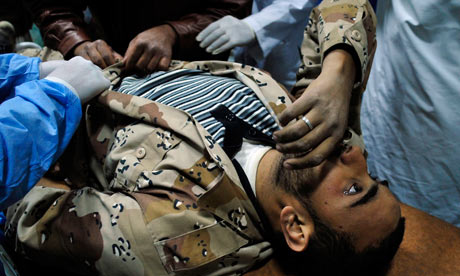No apology from Nato for air strike on Libyan rebel tanks
Deputy commander says fighter pilots didn't know rebels had armoured vehicles in advance of fatal attack near Ajdabiya
- guardian.co.uk,
- Article history

A wounded rebel is helped into a hospital in Ajdabiya on Thursday, the day after an attack by Nato jets killed at least five rebel fighters. Photograph: REUTERS
Nato has refused to apologise for an attack on Libyan rebel forces in the east of the country in which at least five people were killed, saying it had not been told the rebels had tanks.
The attack on Wednesday between the towns of Brega and Ajdabiya killed at least five rebel fighters. Doctors reported up to 13 deaths. Armoured vehicles were destroyed.
A similar attack by Nato planes five days earlier killed a reported 10 rebel fighters, and this latest bombing has enraged those fighting Muammar Gaddafi's forces.
Rear Admiral Russ Harding, the British officer who is deputy commander of Nato's Libya operation, said the alliance's jets had carried out 318 sorties and struck 23 targets across Libya in the past 48 hours.
"It would appear that two of our strikes yesterday may have resulted in [rebel] deaths," he told reporters in Naples, where the operation is based.
"I am not apologising. The situation on the ground was and remains extremely fluid and until yesterday we did not have information that [rebel] forces are using tanks."
The tanks had been seized from Gaddafi's forces and were being used for the first time by the rebels, whose communications with Nato are patchy.
Harding said Nato's mission was to protect civilians from attack and "when you see their tanks coming up, those are the vehicles that can cause the greatest harm to civilians".
Later, Nato's secretary general, Anders Fogh Rasmussen, said he "strongly regrets" the loss of life.
"We are conducting operations in Libya in accordance with the UN security council resolution with the aim to protect civilians. This is also the reason why our aircrafts target military equipment that could be used to attack civilians, but I can assure you that we do our utmost to avoid civilian casualties."
Wounded rebels were taken to Ajdabiya. A hospital nurse in the town told Reuters that at least five people had died, while the BBC quoted doctors putting the toll at 13.
Rebels outside Ajdabiya were painting their vehicles peach-coloured on Friday to try and make them distinctive from the air.
Rebel leaders are trying to find out whether troops loyal to Gaddafi took advantage of the chaos to move towards Ajdabiya. A reconnaissance party sent in the direction of Brega reportedly came under attack 12 miles from Ajdabiya, suggesting Gaddafi's forces had advanced.
The British Ministry of Defence is providing 500 satellite phones to help the rebels, who have already been given sophisticated communications equipment by the Foreign Office.
The equipment is designed to enable the rebels to communicate promptly and securely with British officials and Nato commanders. Britain is sending a fleet of armoured vehicles to eastern Libya to protect the UK delegation to the Transitional National Council headed by senior diplomat Christopher Prentice.
Pro-Gaddafi troops have pushed into eastern districts of Misrata, the beleaguered rebel-held outpost on Libya's north-west coast, triggering street battles with rebels that forced residents to flee, an opposition spokesman has told Reuters.
Hassan al-Misrati said: "They tried to advance and enter the city from the eastern side, from an area called Eqseer which is a populated area. The rebels confronted them and clashes are continuing."
Separately, a spokeswoman for the UN children's agency, Unicef, said snipers were targeting children. Marixie Mercado told reporters in Geneva that the organisation has received "reliable and consistent reports of children being among the people targeted by snipers in Misrata".
Rebels have appealed for more Nato assistance in clearing Gaddafi loyalists from Misrata, but the alliance says it is constrained in air strikes because of the presence of so many civilians.
Privately, some Nato officials say the rebels are failing to understand the alliance's limited mandate and mistake them for a proxy air force that can be directed at will. "We're trying to get messages back to them about what we're doing and what we're trying to achieve," one anonymous Nato official told the Associated Press.
On Thursday the US general who led the Libyan mission before Nato took it over said it was possible that American ground forces could eventually be used in the country.
"I suspect there might be some consideration [ of ground forces]. My personal view at this point would be that that's probably not the ideal circumstance, again for the regional reaction that having American boots on the ground would entail," General Carter Ham told a Senate armed services committee hearing.
No comments:
Post a Comment